Finding a perfect match is not an easy task… regardless whether it’s Tinder or keyword targeting we’re talking about. Although the art of traffic matchmaking may seem a bit complex, running keyword campaigns is not. Often advertisers are unaware there’s something wrong with the keywords input. As a result, the outcomes of such campaigns aren’t satisfying.
That’s why we’ve prepared the following keyword targeting insights! These should help you understand keyword rules and practices. Follow them and make your campaigns run smoothly.
Read on and learn how to run keyword campaigns that convert!
Choosing targeting options for your campaigns.
Traffic sources offer various targeting options for advertisers to choose from.
The most common choices include:
- broad targeting (also known as Run-of Network),
- specific targeting (based on particular sources or targets),
- location-based targeting (focusing on selected GEOs only),
- keyword targeting (aiming at traffic containing certain phrases).
Different targeting models are suggested depending on:
- the kind of offers advertisers want to promote,
- ad format advertisers want to promote their offers with,
- estimated campaign budget,
- advertiser’s experience with affiliate marketing.
Why or when should you choose keyword targeting?
Advertisers should be able to select the most suitable option for their needs. As we already mentioned, the art of traffic matchmaking may seem a bit complex but it serves one purpose only — for your ads to convert.
If you’re wondering why or when you should go for a keyword targeting option, let us help you with an example of an e-commerce campaign run on domain redirect traffic. One thing that can be said for sure is that keyword campaigns are a great way to match your offers with the right traffic. Imagine a user looking to buy a pair of shoes. What does a user do?
A user goes online to check out available purchase options. Now, various things may happen depending on a traffic type advertisers chose to promote their ads with. It happens so that the said user types in a phrase related to shoes in the URL bar. He or she might be then redirected to your ad/ landing page or directly to an offer. Thanks to the search performed by a user, your ad is then matched with relevant traffic.
This shows that keyword campaigns are a great way to match your offers with the right users. Tapping into consumer demand is thus done automatically based on the searches performed by users. What’s important is that keyword targeting isn’t limited to domain traffic only. Similar case scenarios apply for pop traffic or other ad formats, allowing advertisers to tap into consumer’s demand more effectively.

Run Keyword Campaigns Using Zeropark Now!
Keyword campaigns explained
Setting up and then running a keyword campaign shouldn’t be any different from other campaigns… only you’re required to submit a list of keywords. Even then, it’s a similar case to when you’re submitting a list of chosen sources to receive the traffic from.
Watch the Keyword Campaign Tutorial for step-by-step instructions on how to set things up using Zeropark.
Also, if you’re wondering: Where does the keyword traffic actually come from? What kind of keywords should I submit? and How to do that correctly? Then here are the answers.
Where does a keyword campaign’s traffic come from?
Answering the first question, keywords alone do not generate traffic. The traffic comes from actual sources or domains aggregated by publishers and containing selected phrases. Publishers who direct traffic to traffic sources group their inventory into categories that help to ensure the quality of offered traffic and allow more precise keyword matching. The example could be differentiating between adult and mainstream content.
What kind of keywords should advertisers submit?
The major rule behind choosing keywords for your ad campaign is that these keywords should be relevant to the promoted offer. In this way, they’re more likely to match the terms entered by users. To be more precise, let’s have a look at how it works for various ad formats, for example, pop and domain traffic.
- If advertisers choose to run pop traffic campaigns, then the keywords submitted are matched with the content or name of websites users are visiting.
- If advertisers choose to go for domain redirect traffic, then the keywords are matched with the misspelled or similar domain names.
The following examples show where supply meets demand. It is clearly visible that keywords with simple structures are prevalent. Such keywords meet the quality criteria established by traffic sources and align with user demand. It’s also worth mentioning that top keywords are usually related to e-commerce verticals as well as seasonal hypes.
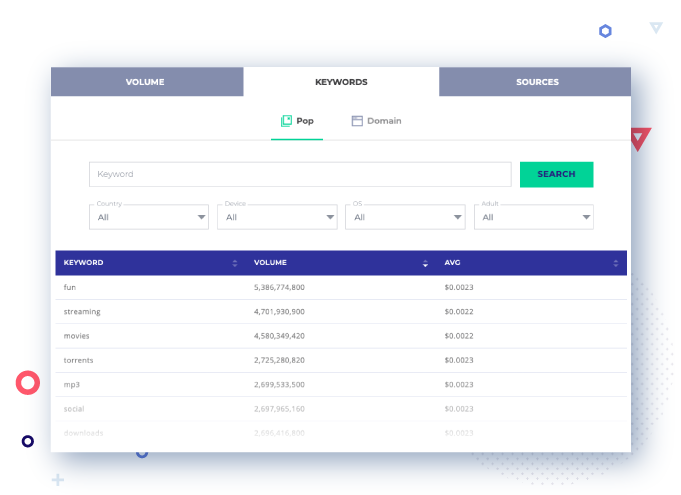
Broad vs. Exact keyword targeting
Usually, two match types are offered for keyword campaigns — broad and exact keyword matching.
Exact keyword targeting
Exact keyword targeting means that only the exact version of submitted keywords will be used to match the traffic. This option significantly narrows down the scope of targeted traffic.
For example, if we select exact keyword targeting and submit a youtube keyword, then this will be the only phrase matched. Other variations, even if still relevant to the topic, like youtube.com, won’t be in scope.
Broad keyword targeting
Broad keyword targeting means that a submitted keyword and its variations will be used to match the traffic. This option significantly broadens the scope of targeted traffic.
For example, if we select broad keyword targeting and submit a youtube keyword, then this keyword and its variations, like youtube.com, will be matched. Other variations, even if not relevant to the topic, as youtuberobot will also be in scope.
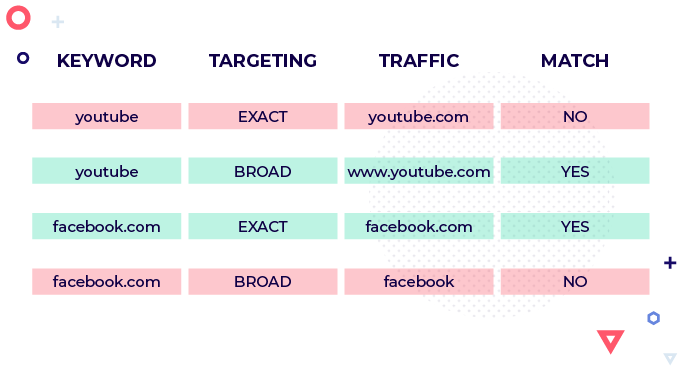
As shown by the above example, the general rule for keyword matching goes as follows: An exact match requires the same keyword from the supply side. Broad match accepts keywords that contain the phrase.
Negative keywords
Negative keywords option allows advertisers to exclude chosen keywords (both exact and broad keywords) from their targeting. This option helps with fine-tuning the keyword campaign targeting, hence improving its optimization.
For example, if an advertiser wants to choose broad keyword targeting for a youtube keyword, but doesn’t want to receive traffic matched with youtuberobot, then entering the youtuberobot keyword into the negative keyword section solves the issue.
Keyword campaigns problems explained.
Success of any keyword campaign lies with the keywords entered and targeting optimization. But sometimes, despite tens of relevant keywords submitted by advertisers, results may still be unsatisfying. In such a case, there are two ways of solving the problem. Advertisers can either switch to another targeting type or revise actions taken and identify the root of the problem.
That’s why we’ve decided to carry out an industry research and investigate Zeropark’s historical data for the most credible findings. This allowed us to discover that most of the time, the problem lies with the incorrect keyword input.
As easy as submitting a list of keywords may seem, these are the little details that hinder the campaign’s performance. Hence, we compiled a list of tips for advertisers to help them understand how to enter campaign keywords correctly and run keyword campaigns that convert.
Try Keyword Targeting With Domain Traffic! Read The Ultimate Guide to Domain Redirect Advertising and Learn How!
The DOs and DON’Ts of keyword targeting.
The below instructions may seem obvious or of little importance, but ignoring these simple steps prevents your campaigns from receiving traffic.
Read the below tips and learn the DOs & DON’Ts of keyword targeting!
#1. Using website names/addresses is always recommended. Especially if you’d like to use keyword targeting for your domain redirect traffic ad campaigns. The full URL address is an incorrect keyword format, though. Skip the http:// or www part and stick to example.com part only.
#2. Buying traffic from misspelled domain names is often mentioned as a good practice, and that’s true. But using misspelled keywords to match such domains is not the right step. Even if you aim to buy traffic from misspelled domain names provide correctly spelled keywords and let the traffic platforms do the matching.
#3. Avoid typos at all times — not just in case of domain traffic. This easily overlooked mistake may prevent your ads from receiving relevant traffic.
#4. Avoid special characters — same as above, this may hinder the process of traffic matchmaking as the system will look for phrases including such characters too.
#5. Avoid long/multiple term phrases or merges like sportclothing. Simple words or short word clusters are the best, go for sport clothing as two separate words.
#6. Similarly to long term phrases, Google search style is not recommended. Do not provide terms like cheap flight canary islands as such phrases are simply unlikely to get a match.
#7. Remember whether the keywords you submit should match the broad or exact targeting.
#8. Don’t forget about the negative keywords option.
#9. Use tools like, for example, Zeropark’s Traffic Calculator to research keyword variations, available volumes and suggested bid prices.
#10. Use other tools available online to help you research popular or related keywords.
Here are examples of erroneous keywords containing the mistakes listed above. Please note that .com style is not treated as faulty. This format matches easily with injection traffic keywords but may hinder other searches, depending on the whole structure of a given keyword.
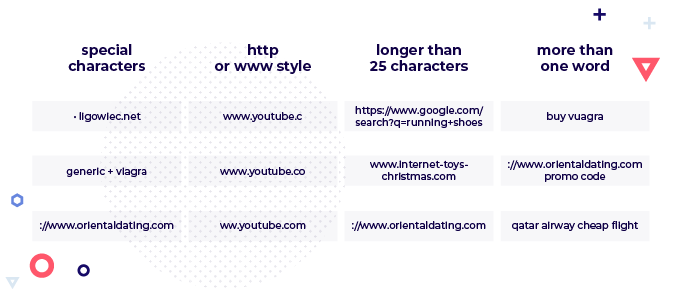
For More Instructions On How To Run Keyword Campaigns With Zeropark Click Here!
How to find relevant keywords.
Finding keywords relevant to promoted offers isn’t a difficult task but having a little help won’t hurt. There are several tools or ways that can help you find the best keywords or increase traffic matches.
- Research the market — Google similar items/offers and see what’s currently trending.
- Check community forums — the affiliate community shares valuable information and forums are usually full of tried and tested examples.
- Spy on your competition — use spying tools can help you identify the areas to focus on.
- Use online resources — SEO tools, keyword searches, keyword mapping tools (e.g. AnswerThePublic.) Anything that helps you identify currently trending or relevant keywords can be used here.
- Use Traffic Calculator tool — and learn the available volumes and average bid prices for keywords you’d like to submit.
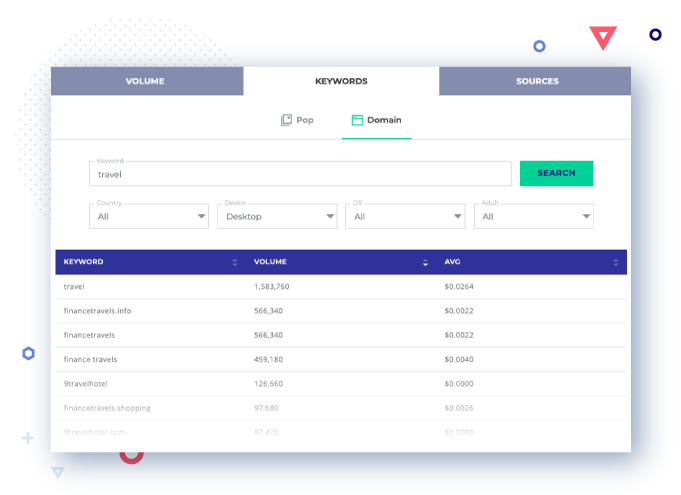
Traffic Calculator for keyword targeting campaigns.
As mentioned above, a Traffic Calculator tool may be a great help for advertisers who’d like to check how their keywords rank in comparison to traffic source historical data. The Zeropark’s Traffic Calculator, for example, aggregates data from the last seven days allowing advertisers to check:
- Currently trending keywords and their variations.
- Available volumes of traffic per given keyword.
- Average bid prices per given keyword.
This data can be further narrowed down to keywords specific for:
- GEOs
- Device types
- OS
- Adult or mainstream traffic.
In this way, advertisers are able to estimate their budgets accounting for even more granular targeting and plan their campaign accordingly with respect to what’s currently popular.
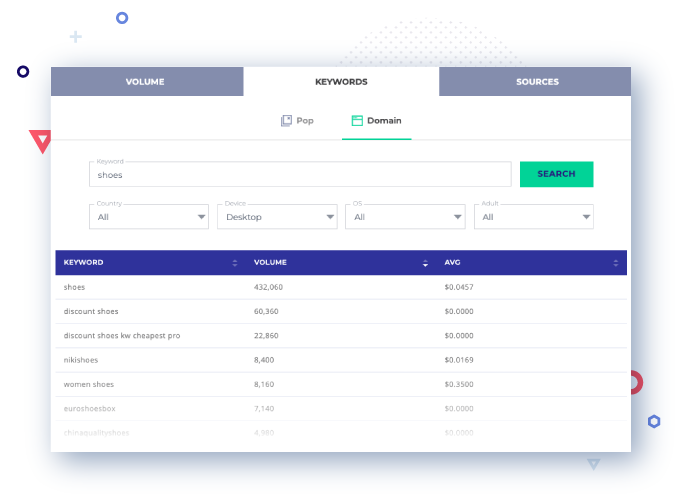
Injection traffic for keyword campaigns.
With the dynamically changing world of affiliate marketing, things constantly get improved to bring even better results. That’s exactly what’s happened with injection traffic. But how does it work exactly?
Injection traffic comes from a toolbar inserting pop ads into a webpage. When a user types in a URL, ads are injected under keywords linking to affiliate offers. The ads are then triggered automatically by toolbars/extensions installed in user browsers.
It’s especially good for e-commerce, travel, dating or nutra verticals these days. We recommend Keyword targeting for the most accurate optimization, but broad targeting is also possible. Naturally, running brand-to-brand campaigns using brand URLs as your keywords would be the best format. In this way, you’re able to target highly motivated users and scale up your campaigns.
Scale up running keyword campaigns
Running keyword campaigns for offers related to seasonal hypes can be a great way for boosting your campaigns all year round!
The process doesn’t differ much from running other campaigns. Yet, it’s the nature of the keyword targeting that allows for reaching highly interested users. It’s because your ads are displayed to users potentially interested in offers you’re promoting while they’re actually searching for it. As long as you remember to do keyword targeting right, you’re good to go!
Learn How To Do Keyword Targeting That Converts
RUN KEYWORD CAMPAIGNS USING ZEROPARK NOW!
Kinga Gawron


